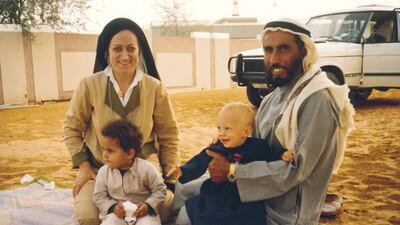It was 5am. The effects of coffee were not kicking in, so I continued to rub my eyes as I followed Ali Hassan Al Shehhi on a 15 kilometre hike deep into the mountains of Ras Al Khaimah.
He was in a pair of well-worn plastic flip-flops, I was in heavy- duty climbing boots. And yet as this member of the formidable Al Shehhuh mountain tribe took me to one of the last inhabited ancient villages – this was back in 2008 – it was I who lost two toe nails and ripped my cargo pants.
“Look, even the goat is making fun of you,” he said, pointing to a mountain goat that was following us. Funnily enough, it did sound like it was laughing at me.
As this man in his late 40s hopped about effortlessly along a difficult unmarked trail to his village, he kept saying: "Yala, yala, it is very close, just around the corner." Five hours later, the party of six – Mr Shehhi, Mohammed bin Sultan Al Khateri from the desert tribe (who helped me understand some words of the Shehhi dialect), The National's team and two Pakistani workers, each carrying about 50kg of food and drinks on their heads – arrived in the isolated village of Baqal.
Besides documenting a very interesting way of life and lovely old homes made of stone, I met many insects I didn’t know existed. And there were strange howls in the night that didn’t sound like any animal I knew.
“Don’t worry, it is just the Jinn,” said Mr Al Shehhi, nonchalantly feasting on a piece of watermelon carried in from the city.
I grew up on a saying that some attribute to the Prophet Mohammed: “Seek knowledge even if you have to go as far as China.” So when I had to climb mountains, drive through valleys and trek across deserts for stories, I did so with enthusiasm and pleasure.
This story with Mr Ali remains one of my favourites, because I learnt a lot. I learnt about a then-fading, and now gone, way of life, and I learnt that I am more spoilt than I thought. The next day, with my feet puffed up and every muscle aching, I demanded that a helicopter come and save me. But the local head of police said there was no place for a helicopter to land.
“You will just have to walk back down,” he said. It was the most painful walk of my life.
The trip was undertaken so I could write a story for this paper, but there have been many other encounters that never made it to print. You may be surprised to know that, in my 15 years’ experience, it’s those people with the greatest stories to tell who are the most hesitant to share them.
One such story was the one I first wrote in 2008, and revisited in an article in The National this week, about the bond between a Spanish woman, Inocenta Ewart, and a Bedouin mother, Um Ahmed, who became family by breastfeeding each other's babies.
The Ewart family and the desert tribe of Khawater truly watch over each other. I have rarely seen such a strong and loving bond between two families who came from different worlds. It took a while to gain the trust of all those involved and, in the end, it was such an honour to tell their stories the best way I could in the space available to me.
Life has truly been an adventure for Mrs Ewart and her husband, John. The couple’s own love story happened by chance, when he, a young professor teaching English in Benghazi, Libya, met her, a veterinarian’s daughter, when he parked his red MGB sports car in front of her father’s car.
“One day this very pretty Spanish lady, dressed in a blue two-piece outfit stopped me to say: ‘Would you please mind to move your car?’ – and I fell for her right then,” said Mr Ewart.
Asked about their amazing life, Mrs Ewart replied: “It was written” – which is a very Arab thing to say, meaning everything in life is predestined.
There are so many beautiful stories. When you get a chance to sit with someone older, ask, listen and even write down their stories. We too often take for granted what is right in front of us.
rghazal@thenational.ae
On Twitter: @arabianmau

